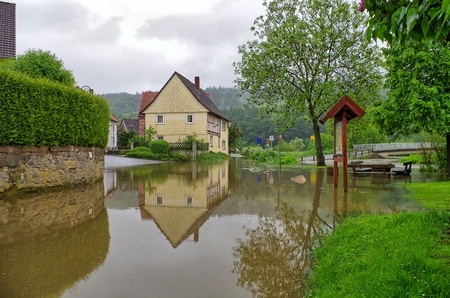

Be Prepared for a Flood with these Flood Safety Tips!
Some areas are more prone to floods than others but even if your home isn’t in a flood zone you could still end up driving through an area with flooded streets. The risk of flooding increases in the fall and winter when we are more likely to experience heavy rain. If you are concerned about flooding, check NOAA’s website weather.gov, ready.gov, and your city’s website for local flooding updates and safety tips.
Follow these flood safety tips to keep yourself and your family safe:
- Turn Around, Don’t Drown. Just six inches of moving water can knock a person down and two feet of water can sweep your car away!
- Listen to road-closed signs; roads are closed for public safety. If there is water on the roadway, do not drive through the area.
- Stay away from river banks, levees, and flood waters.
- Be aware of and respectful of utility crews working the flood.
- Yield to emergency vehicles and never block an intersection.
How to Prepare Your Household
- Use the Take Winter By Storm “Get ready for heavy rains and flooding” Checklist to prepare your home for heavy rain or flooding.
- Check in advance to see if your city will provide sand and sandbags to the public for use on private property upon “Emergency” declaration by the County. If they will, know who to contact in case of actual flooding.
- Check to see if your area qualifies for flood insurance and consider purchasing.
Basic Flash Flood Safety Tips from Ready.gov
- Flash floods are the number one cause of weather-related deaths in the US.
- If there is a chance of flash flooding, immediately get to higher ground.
- If floodwaters rise around your car but the water is not moving, abandon the car and move to higher ground. Do not leave the car if it means entering into moving water.
- Avoid camping or parking along streams, rivers, and creeks during heavy rainfall. These areas can flood quickly and with very little warning.
If your area has been put on “Flood Watch”, it means that conditions are such that flooding could occur.
- Turn on your TV and/or radio to listen for the latest weather updates and emergency instructions.
- Make a plan of where you will evacuate to higher ground if waters begin to rise in your neighborhood. Make a plan for escape by both vehicle and on-foot.
- Check and re-stock your emergency preparedness kit and put it in a backpack for easy carry.
If your area has received a “Flood Warning” it is time to take action and move to higher ground. Evacuate your home if directed to do so.
- Bring in outdoor furniture and move important indoor items to the highest possible floor to help protect them from flood damage.
- Disconnect electrical appliances and do not touch electrical equipment if you are wet or standing in water as you could be electrocuted.
- If instructed, turn off your gas and electricity at the main switch or valve to help prevent fires and explosions.
- If flood waters are rising in your neighborhood be prepared to evacuate before the water reaches your property.
- Secure your home before leaving: turn off electricity, gas, and water if possible.
After a flood is over, do not return home until you have received the okay from local authorities.
- Plan your route home with an understanding of the areas where floodwaters have receded.
- Watch out for debris that may have washed onto the roadways from the flood.
- Do not attempt to drive through areas with standing water; standing water may be electrically charged from underground or downed power lines.
- When you get home, photograph damage to your property for insurance purposes.
If you or a loved one were injured in an accident, you have enough to deal with. Let an experienced accident attorney fight for the full compensation that you deserve. It is not uncommon to receive a settlement from the insurance company that is five to ten times bigger with the help of a lawyer. Call the caring accident attorneys at Tario & Associates, P.S. in Bellingham, WA today for a FREE consultation! We have been representing residents of Whatcom County, Skagit County, Island County and Snohomish County since 1979. You will pay nothing up front and no attorney fees at all unless we recover damages for you!




